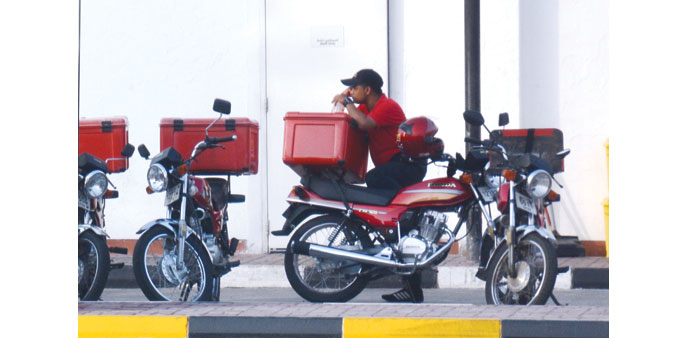Riders bear the brunt of the heat and high humidity in Qatar. (Right) A car cleaner at work at a shopping complex. (Pictures used for illustrative purposes only). PICTURES: Joey Aguilar
By Joey Aguilar
Fast food deliverymen on motorbikes, car cleaners and fuel station attendants are some categories of workers in Qatar who bear the brunt of summer, besides construction workers.
The rising humidity becomes another challenge — non-stop sweating all through the day and even during evening and night while on duty and the risk of heat exhaustion.
“The weather is really too much to bear while you’re on a motorcycle. It seems to be getting hotter every year,” said Carlo (not his real name), who works as a deliveryman at a fast food outlet along the airport road for nearly four years.
He told Gulf Times that he and a number of his co-riders had to see a doctor recently after falling sick.
Citing the nature of their work, one Sri Lankan said a deliveryman on motorbike faces a lot of health and safety hazards on the road: dust, smoke from vehicles and the searing temperature. He was thankful that most of the orders in the past days were at night time.
Some of the riders have also met with accidents and suffered minor injuries — a reason why most workers tend to stay only for a short period of time.
“When it rains, that is another problem. The road becomes too slippery which is really dangerous for us,” he added. “For a monthly salary of QR1,200, it is not worth the risk.” The Sri Lankan plans to resign and go back home to look for other greener pastures.
Like the riders, some Nepali car cleaners working in some parking lots also complain of the harsh weather. The thick coveralls they have to wear does not provide proper ventilation and hence the discomfort is high.
For QR750 monthly salary, Tojo (not his real name) admitted he made a mistake of accepting the offer when he was in Nepal.
From the QR15 fee that each customer pays for the car wash, he does not get any commission. Some customers offer a few riyals as tips.
While they get free meals every day, Tojo said it was better not to discuss about the taste and quality of the food. He also plans to go back to Nepal after his two-year contract ends next year.
For fuel station attendants too, through they work under shade, the heat and humidity remains a big challenge during summer — plus other health hazards such as inhaling vapours of petrol and diesel, and dust, especially when there is a sandstorm, and other pollution.
To cope up with the hot weather, one Indian national noted that they drink plenty of water. “It is a good thing our company gives us electrolyte solution to prevent dehydration,” he said.
Asked to compare their situation now in Qatar and back home, one of the Asian workers said it is hard to say which one is better.
However, he hopes the company will consider increasing their salary so that they could buy vitamins and supplements to stay healthy and strong.
Fuel station attendants receive a monthly salary of QR1,200 with free meals. But like the food being served in labour camps, “I could say you can eat it when you’re hungry,” said one of the workers.

